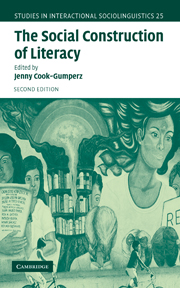Book contents
- Frontmatter
- Contents
- List of figures
- List of tables
- List of contributors
- Preface
- Acknowledgments
- 1 The social construction of literacy
- 2 Literacy and schooling: an unchanging equation?
- 3 Interactional sociolinguistics in the study of schooling
- 4 The language experience of children at home and at school
- 5 Narrative presentations: an oral preparation for literacy with first graders
- 6 Differential instruction in reading groups
- 7 Organizational constraints on reading group mobility
- 8 Developing mathematical literacy in a bilingual classroom
- 9 Spoken language strategies and reading acquisition
- 10 Speaking and writing: discourse strategies and the acquisition of literacy
- 11 The implicit discourse genres of standardized testing: what verbal analogy items require of test takers
- References
- Author index
- Subject index
11 - The implicit discourse genres of standardized testing: what verbal analogy items require of test takers
Published online by Cambridge University Press: 05 June 2012
- Frontmatter
- Contents
- List of figures
- List of tables
- List of contributors
- Preface
- Acknowledgments
- 1 The social construction of literacy
- 2 Literacy and schooling: an unchanging equation?
- 3 Interactional sociolinguistics in the study of schooling
- 4 The language experience of children at home and at school
- 5 Narrative presentations: an oral preparation for literacy with first graders
- 6 Differential instruction in reading groups
- 7 Organizational constraints on reading group mobility
- 8 Developing mathematical literacy in a bilingual classroom
- 9 Spoken language strategies and reading acquisition
- 10 Speaking and writing: discourse strategies and the acquisition of literacy
- 11 The implicit discourse genres of standardized testing: what verbal analogy items require of test takers
- References
- Author index
- Subject index
Summary
A decade ago, the publication of The Bell Curve (Hernstein and Murray 1994) provoked a wide range of responses. Among them was the establishment of a task force by the Board of Scientific Affairs of the American Psychological Association. Their charge was to create a report clarifying what the community of experts on intelligence agree is and is not known about intelligence. At the heart of their work (Neisser et al. 1996) was the question of causes behind group differences in performance on standardized tests of achievement and aptitude, sometimes referred to as ‘the achievement gap’ (Jencks et al. 1998). The report was framed within the most influential conceptualization of intelligence and achievement, the psychometric approach. With respect to the gap of about one standard deviation between scores of black and white Americans on tests of intelligence and aptitude, the panel concluded that
[it] does not result from any obvious biases in test construction and administration, nor does it simply reflect differences in socioeconomic status. Explanations based on factors of caste and culture [as explicated in, e.g.: Ogbu and Matute‐Bianchi 1986] may be appropriate, but so far have little direct empirical support. There is certainly no such support for a genetic interpretation.
Neisser et al. 1996: 97The same inconclusiveness attends the achievement gap between other groups, including males and females.
- Type
- Chapter
- Information
- The Social Construction of Literacy , pp. 264 - 287Publisher: Cambridge University PressPrint publication year: 2006
- 3
- Cited by



